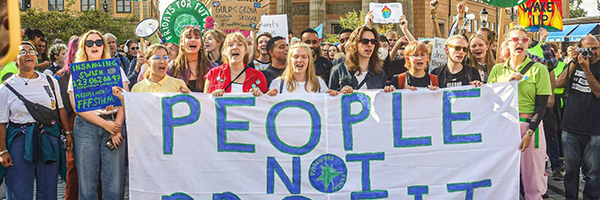New report exposes how the ultra-rich 1% maintains massive carbon emission discrepancies with the poorest 66% of the globe.
A new report from Oxfam International reveals alarming disparities in carbon emissions, underscoring a stark contrast between the wealthiest 1% of people and the rest of the planet, with the poorest percentage of the population left to bear the brunt of the environmental damage.
The report titled, “Climate Equality: A Planet for the 99%,” makes clear the impact of such emissions, stating that in 2019, the emissions of the super-rich 1% “are enough to cause 1.3 million deaths due to heat.”
Violations and disparity in emissions are also highlighted in the report, including the 1% burning through twice as much of the carbon budget as the poorest half of humanity combined in the last 30 years. Additionally, the emissions of the 1% exceed the safe limit by over 22 times and annual emissions cancel out the carbon savings equivalent to nearly a million onshore wind turbines.
Oxfam calculations indicate that an individual in the bottom 99% would need approximately 1,500 years to generate the same amount of CO2 pollution as the world’s top billionaires produce in just one year.
Annex 1 countries, classified by the UN Framework Convention on Climate Change (UNFCCC) as the most industrialized countries, “have been found, because of their historical and often colonial past, to be responsible for 90% of excess emissions, and Global North countries specifically for 92%.”
The report also stated, “One high-profile study found that 70% of industrial carbon emissions since 1998 come from only 100 oil, coal and gas producers.”
Oxfam identifies three avenues through which the wealthiest 1% exacerbates the climate crisis: first, through carbon emissions stemming from daily consumption, including lavish lifestyle practices (yacht and private jet usage); second, through investments and share-holding in heavily-polluting industries; and third, by wielding influence in media, politics and policymaking.
Examining the individual contributions, the report references a study that found “the lifestyle emissions of 20 billionaires (18 of them men, and all of them white) found that each produced an average of over 8,000 tonnes of CO2 in one year.”
The report highlights how billionaires possess unbridled influence over powerful corporations through investments and share-holding, allowing for control over emissions and environmental impact, stating, “Investments of the top 1% are estimated to account for between 50% and 70% of their emissions.”
The report also states,
“In 2022, Oxfam undertook an analysis of 125 billionaires and found that, on average, they emitted 3m tonnes of CO2e a year through their investments – over a million times more than the average for someone in the bottom 90% of humanity.”
From a political perspective, Oxfam uncovers how American politicians with powerful authority over climate agreements, specifically US senators, “have a salary that puts them in the top 1% of carbon emitters globally. European commissioners are in this bracket too, and so are Australian MPs.”
“Governments globally, including the U.K., need to tackle the twin crises of inequality and climate change by targeting the excessive emissions of the super-rich by taxing them more…This would raise much-needed revenue that could be directed to a range of vital social spending needs, including a fair switch to clean, renewable energy as well as fulfilling our international commitments to support communities who are already bearing the brunt of the climate crisis,” Chiara Liguori, Oxfam’s senior climate justice policy adviser, said in a statement to Common Dreams.
The report also outlines a tax plan, breaking down the potential levies on wealthy individuals and corporations. The plan aims to raise funds to mitigate climate damage and contribute to the development of a more sustainable future infrastructure.
Despite previous commitments and calls for reform, wealthy countries have failed to maintain their responsibility for climate justice. As Oxfam points out,
“In 2009, at COP15 in Copenhagen, developed countries committed to increasing finance to support climate action in developing countries to US$100bn a year by 2020. So far, they have resoundingly failed to keep this promise, reaching only US$83.3bn in 2020. What’s more, Oxfam’s analysis finds that, in 2020, the net value of financial support specifically aimed at climate action only amounted to US$21bn–24.5bn, significantly lower than officially reported numbers suggest.”


